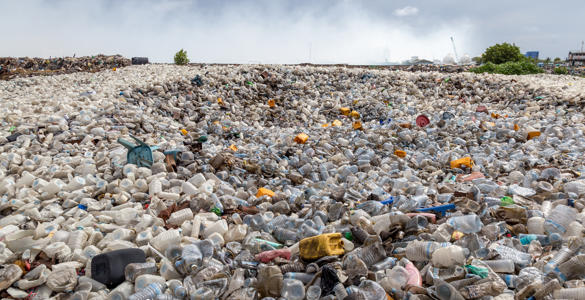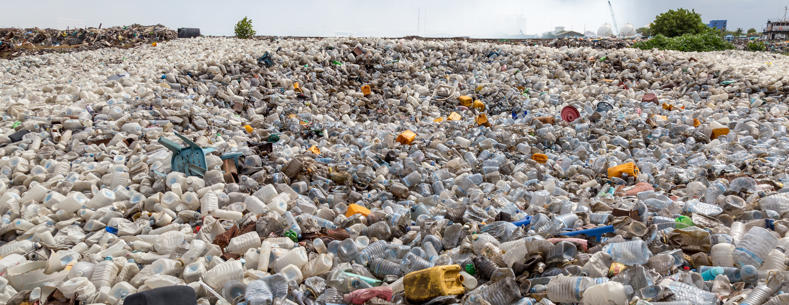Plastic pollution is a major environmental issue impacting human and ecosystem health. What measures are being taken to address this issue – both in Wales and internationally?
This guest article by Dr Winnie Courtene-Jones, Bangor University, explores this issue for Plastic-free July 2025, as part of our knowledge exchange programme. The views are that of the author, not Senedd Research or the Senedd.
In August 2025, representatives from 175 nations, along with NGOs, academia and the private sector will converge on Geneva, Switzerland for INC-5.2, the final Intergovernmental Negotiating Committee (INC) meeting to develop a legally binding Treaty to end plastic pollution. This landmark event presents the opportunity to implement a globally binding framework to tackle plastic (from its production, to disposal) in order to protect human and environmental health. Will actions taken in Geneva ensure these goals translate into tangible outcomes?
This article discusses progress towards, and the necessity of, the UN Global Plastics Treaty, as well as considering efforts taken in Wales.
The Plastic Pollution crisis - Why is a global policy needed?
Plastic pollution is a global threat. Plastics (large items, as well as small plastic pieces termed microplastics) are widely distributed throughout the natural and urban environment, including in soils, the ocean, streets, roadsides and the atmosphere. The sheer quantities and the range of detrimental effects associated with plastics, from extraction of raw materials, through to their production, use and disposal, necessitates global action; some of these effects are summarised below:
- Annually, 460 million tonnes of plastics are produced, a figure which is set to double in the next two decades. Less than 10% is recycled globally.
- Plastic is persistent, over 139 million tonnes of plastic waste are estimated to pollute marine and freshwater environments.
- Over 16,000 chemicals have been identified within plastics, including chemicals of concern, such as those which disrupt the human nervous and hormonal systems, and others that can cause cancer. Chemicals can leach out from plastics during their use, and after disposal.
- Scientific evidence shows adverse human health outcomes, as well as environmental damage associated with plastics and their chemicals.
- The life cycle of plastic (from extraction of raw materials- through to when they become waste) accounted for 4.5% of global greenhouse gas emissions in 2015.
What is the United Nations Global Plastics Treaty?
The United Nations Global Plastics Treaty is an international legal agreement to tackle plastic pollution. Negotiations on the contents of the Treaty commenced in 2022, and will draw to a close at a final meeting in August 2025. The Treaty aims to comprehensively address the full life cycle of plastic, including its production, design, and disposal.
Negotiations over the last three years and the five INC meetings have encountered challenges: from deadlock over procedural technicalities, to disagreement over limiting plastic production, restrictions on the use of chemicals of concern, and financial mechanisms to support implementation. However, while the last INC (INC-5 in Busan, November 2024) concluded without final agreement, a strong foundation was laid. Delegates agreed to resume talks in Geneva using the “Chair’s text” as a starting point, and in the closing plenary over 100 countries committed to ambitious measures.
The challenge now is to build on this momentum, to ensure that ambition translates into tangible outcomes and that key provisions are not diluted.
In the words of the INC Chair, Luis Vayas Valdivieso, “Nothing is agreed until everything is agreed.” A lot is resting on INC-5.2 next month.
A global issue requiring global action
While local and national-scale strategies make small steps forward, a global approach to tackling plastic pollution is vital to meaningfully protect human and environmental health. Such multilateral global agreements have proved highly effective in the past, for example the Montreal Protocol to protect the Earth’s ozone layer.
Wales’s progress to tackle plastic waste and pollution
Preceding the global measures to end plastic pollution, and in response to the growing concerns surrounding this challenge, numerous countries, including Wales have implemented and are developing further measures to mitigate plastics.
Reducing plastic use
Across the UK, a number of “single-use plastic” items are regulated under implemented or proposed bans. In 2023, Wales introduced legislation on a range of single-use plastic items (e.g. takeaway food containers, stirrers, and plastic-stemmed cotton buds), and wet wipes containing plastic will also be banned by the end of 2025.
Following the ban on rinse-off microbeads in cosmetics (implemented in Wales in 2018), a statement on plans to tackle microplastic pollution was issued in 2021. Over the subsequent years, while other EU countries and the USA have introduced legislation on microplastics, further action in Wales has been limited.
The policies highlighted here make efforts to combat plastic pollution, with a focus largely on pollution arising from single-use plastics. Single-use plastics only account for half of all plastics, consequently it is not possible to address the wider impacts arising from plastics, without also tackling other types of plastic.
Increasing Re-use and Recycling
Wales’ recycling rate exceeds the UK average, but vary between local authorities. Efforts to increase collection capacity, as well as scaling-up sorting and waste management infrastructure, can further establish Wales as a leader in recycling.
But recycling alone will not solve the plastic pollution problem, or achieve a sustainable future. In its 2020 Beyond Recycling strategy, the Welsh Government outlined its proposal to ‘move towards zero waste by 2050 in a new circular economy strategy’ emphasising its commitment to a more sustainable future.
The recent UK-wide Extended Producer Responsibility (EPR) scheme for packaging reforms the way that plastic packaging is managed across the UK, placing the responsibility for the full cost of packaging waste management on businesses. Its goals are to reduce unnecessary packaging, move to circular business models and reduce environmental pollution. The coordination across the UK is encouraging for the implementation of this measure.
Less certain is the Deposit Return Scheme (DRS), which has been on Wales’ agenda since 2018. The Cabinet Secretary announced plans for a consultation on a Wales-only DRS in 2025-2026, but subsequently announced that a Welsh DRS will initially be aligned with the rest of the UK on delivery timescale and interoperability. DRSs, which provide a financial incentive for people to recycle items such as plastic and glass bottles, have achieved high success rates across the EU, including achieving >97% packaging return rate in Germany.
Looking ahead
While the details and content are not yet finalised, the work will not end when Treaty talks conclude. Governments around the world, including in Wales, will be tasked with ensuring that policies are developed to uphold commitments and make meaningfully steps to achieve its goals.
Article by Dr Winnie Courtene-Jones, Bangor University
Dr Courtene-Jones is a lecturer in marine pollution researching the environmental prevalence and effects of plastics. Winnie is an active member of the Scientists’ Coalition for an Effective Plastics Treaty, an international network of independent scientific and technical experts contributing robust scientific information to the Treaty process. Summaries across a range of topics are freely available.






